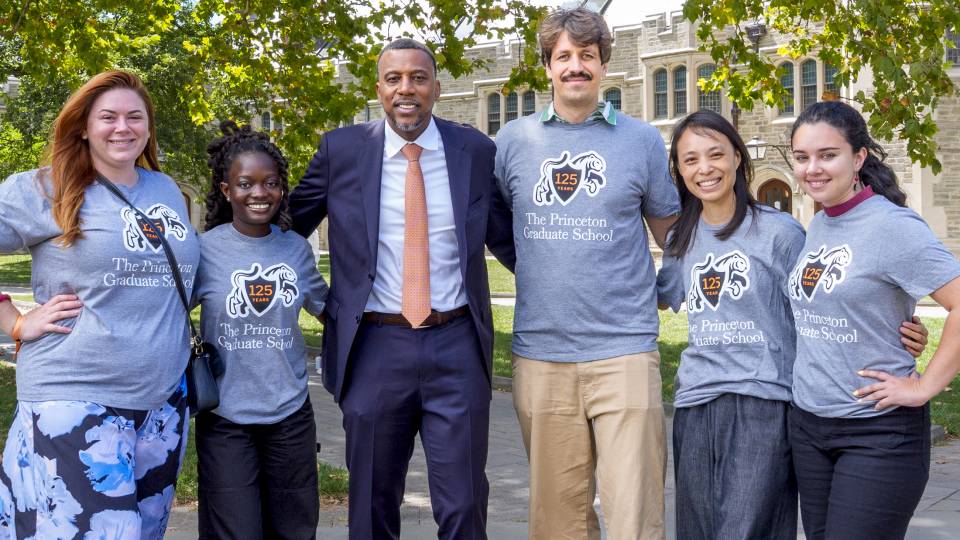Mentorship and social and academic support are necessities for graduate school success. For underrepresented students, who may be from low-income backgrounds and/or the first in their families to have attended college, that need often is felt even more keenly.
To enhance and support the academic, social and community development of underrepresented students during their studies, Princeton University’s Graduate School established the Graduate Scholars Program (GSP).
Now in its third year, GSP empowers students to take a strategic approach to their graduate education, and it allows students to more easily access the many resources that are available at Princeton and beyond.

The Graduate Scholars Program, aimed at supporting underrepresented students in their graduate studies at Princeton University, welcomed 55 students from 28 academic departments this fall. Due to the COVID-19 pandemic, the program held its opening retreat online, including a panel where advanced graduate students shared their experiences with incoming GSP scholars.
This fall, the program welcomed 55 students from 28 departments. Students are recommended to the program by their respective academic units. Due to the COVID-19 pandemic, the program currently is being conducted through virtual programming.
“I believe the work of becoming a scholar is not a solitary endeavor, and those who are most joyful and successful very early on identify a community of peers and mentors who accompany and encourage them,” said Rayna Truelove, the Graduate School’s assistant dean for access, diversity and inclusion, and director of GSP. “My hope is that GSP is a space where students can build a lasting community at Princeton.”
This year’s incoming cohort met for the first time online in late August, getting to know one another through a virtual lunch and by teaming up to participate in a virtual escape room. The scholars also heard from a panel of current graduate students, who discussed common issues and shared insider tips — including the best places to dine around campus.
“The opening events during the GSP retreat were a fantastic blend of social ice-breakers and team-building activities,” said Elijah Smith, a Chicago native and graduate of the Boston Conservatory and the Peabody Institute, who is pursuing a Ph.D. in music composition.
Smith said he immediately appreciated how the other scholars’ fields of study, backgrounds and experiences allowed them to approach each challenge in the escape room from various perspectives. “I felt that I got to know my colleagues better through working together than I would have if we had just asked each other generic ice-breaker questions,” he said.
“As a former conservatory student, I've also become so used to being academically surrounded by only other musicians and artists, and I'm looking forward to getting to know people who do something radically different from what I do and taking in as many different perspectives as possible,” Smith added.
GSP is rich with opportunities for the scholars to connect with others outside of their fields of study.
Participants in the program meet six- to eight times over the academic year for workshop sessions focusing on the transition to graduate education at Princeton. These seminars cover a range of topics including time and task management, budgeting and financial planning, and self-care.
This year will feature new academic workshops for students in STEM fields, as well as programming targeted for students studying humanities and social sciences. This is also the first year programming will be extended to previous GSP scholars, now in their second and third years of graduate studies.
GSP will partner with the Presidential Postdoctoral Research Fellows, a program aimed at enhancing diversity in the professoriate, and with GradFUTURES, a campus-wide collaborative initiative to expand professional development opportunities for graduate students, to provide additional learning opportunities.
Each scholar is assigned to a dean or staff member in the Graduate School who serves as their mentor during their first academic year, helping them to think about the non-academic aspects of their lives and serving as a complement to their departmental advisers.
GSP participants also pair with advanced graduate student mentors and are assigned to a “pod” of five to six fellow first-year students, with whom they will share community dinners and social activities.
“Students who have community support, who have relationships with faculty and students, they definitely tend to have a better experience,” said Renita Miller, associate dean for access, diversity and inclusion. “I think this is even more important for underrepresented minorities in predominately white institutions to feel a sense of belonging and community.”
Miller said the benefit of having student mentors in addition to faculty and staff mentors is that students are more inclined to be open and honest with peers who once stood in their shoes. “They’re able to ask questions they wouldn’t normally feel comfortable asking staff and faculty, and they’re able to build trust with their mentors in a way that when things get really difficult, they’re able to talk through those situations and get advice,” Miller said.
Thirteen advanced-level graduate students will serve as mentors this year.
Rebekah Rashford, a GSP scholar and third-year Ph.D. student in neuroscience from Gaithersburg, Maryland, said she has benefited from the interdepartmental friendships she has made and from the guidance of Truelove, Miller and others.
“The knowledge that these women, along with my peers in the program, are in my corner and are willing to be present to talk to about both academic and personal life has enabled me to take on the challenges I've faced in graduate school with much more confidence than I would have had otherwise,” Rashford said.
Rashford said she hopes to do the same for her own mentees.
“By having guidance through and being able to talk about the goals we have with people in programs like GSP, it gives us confidence to choose the rights steps to steer our career trajectory through graduate school to where we want to end up beyond it,” she said.






